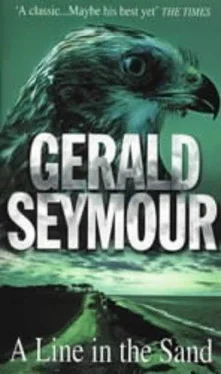Gerald Seymour - A Line in the Sand
Здесь есть возможность читать онлайн «Gerald Seymour - A Line in the Sand» весь текст электронной книги совершенно бесплатно (целиком полную версию без сокращений). В некоторых случаях можно слушать аудио, скачать через торрент в формате fb2 и присутствует краткое содержание. Жанр: Триллер, на английском языке. Описание произведения, (предисловие) а так же отзывы посетителей доступны на портале библиотеки ЛибКат.
- Название:A Line in the Sand
- Автор:
- Жанр:
- Год:неизвестен
- ISBN:нет данных
- Рейтинг книги:3 / 5. Голосов: 1
-
Избранное:Добавить в избранное
- Отзывы:
-
Ваша оценка:
- 60
- 1
- 2
- 3
- 4
- 5
A Line in the Sand: краткое содержание, описание и аннотация
Предлагаем к чтению аннотацию, описание, краткое содержание или предисловие (зависит от того, что написал сам автор книги «A Line in the Sand»). Если вы не нашли необходимую информацию о книге — напишите в комментариях, мы постараемся отыскать её.
A Line in the Sand — читать онлайн бесплатно полную книгу (весь текст) целиком
Ниже представлен текст книги, разбитый по страницам. Система сохранения места последней прочитанной страницы, позволяет с удобством читать онлайн бесплатно книгу «A Line in the Sand», без необходимости каждый раз заново искать на чём Вы остановились. Поставьте закладку, и сможете в любой момент перейти на страницу, на которой закончили чтение.
Интервал:
Закладка:
A Line in the Sand
Gerald Seymour
Prologue.
He knew it was the last time he would be there.
He stepped through the double door of the administration building, held open for him, and the sinking afternoon sun blasted against his face. He blinked hard, momentarily blinded, and stopped disorientated in his tracks. He lowered the glasses from the crown of his head on to the bridge of his nose. They were all around him, crowded in the doorway, and they were his Wends -more than just the people he did business with, true friends.
The car was waiting. The driver stood beside the rear door and smiled at him with respect. The technicians, engineers and managers pressed close to him to shake his hand, hold his arms and brush-kiss his cheeks. The women who worked at the computers and the design benches were behind the men and their eyes beneath their close-wrapped head scarves were lit with warmth, but they did not touch him or speak. The friendships had been nurtured over many years. When he had left the office of the project manager, three or four minutes before, he had started a stuttering progress down a shadowed, cool corridor, stopping by each door to make his farewells. He had been wished a good journey, a safe return home, and he had been told how welcome he would be when he came back the next time.
He knew there would not be a next time.
The sun, full and gold turning to scarlet, hit his face and pierced the protection of his darkened glasses. He grinned and responded to the friendship and trust that was shown him. He had betrayed their trust. The project manager took his arm, led him towards the car, murmured appreciation that he had fallen in with the change of schedule, and squeezed his arm in implicit thanks for the present of a Toshiba laptop. On each visit, three times a year, he brought many presents with him to the complex, and they had a sliding scale of value dependent on the position in the complex of his friends. He brought with him computer equipment and gold or sterling-silver ink pens, toilet soaps and packs of toothpaste. He had come, as always, five days before, his bags weighted with the gifts that cemented the friendship and bound the trust. The vomit was in his throat, and he swallowed hard. As their friend, each time he came, he was invited to restaurants to eat battered prawns or shrimps, or whitefish, and he was invited to their homes. It had taken years of visits to build the friendship and the trust that were a sham.
The driver opened the door of the car. The project manager was flicking the buttons of a personal organizer, a secondary present from the previous visit, to confirm the date on which he would next return. He looked past the project manager at the straggling line by the double doors, all smiling and waving. He said it again, as he had said it many times in the last five days: it had been no problem for him to change his schedule and come a week earlier than originally planned. He wished them well. He did not know what would happen to them. It was the mark of their friendship, their trust, that they had left the cool air-conditioned offices and design rooms to stand in the ferocity of the sunlight to see him on his way, and he had betrayed them. He could not look into their faces or into the eyes of the project manager.
Before he ducked down into the car, a last time, he raked the buildings, scarred by the sun and the salt carried from the sea by the winds, as if it were important that he should remember each final detail.
What Gavin Hughes saw… The complex was a series of wire-fenced compounds. Above the wire-mesh fences around each compound were the silver- and rust-coloured coils of razor wire.
At the gates to each compound were sandbagged sentry points that were covered with decaying canvas to give shade from the sun. The watch-towers at the corners of the compounds were built on weathered wood stilts, and the dipping sunlight caught the barrels of the machine-guns jutting above the parapets. Between the compounds were four anti-aircraft defence positions, two with multiple-barrel Qerlikon guns and two housing a cluster of squat ground-to-air missiles. If it had not been for the friendship and the trust, Gavin Hughes, who was a salesman in engineering machinery, would never have gained access to the complex… He saw the entrance tunnel to the building with the buried concrete walls and bomb-proof ceiling, and that was Project 193. He saw the dun-painted building, into which he had never been admitted, that housed Project 1478. He saw the building where the hot-die forge was installed, where heated metal for the warhead cone was compressed and then cooled for turning and grinding and milling, the home of Project 972. The buildings were spread out across the bright sand, scattered inside the complex perimeter that stretched three kilometres in length and two kilometres in width, and contained the lathes, mixers, presses and machine tools. He would be asked the day after, or the day after that at the latest, what he had seen, what was different from before.
He dropped down into the back of the car and the driver closed the door behind him. He wound down the window and reached out to shake the project manager's hand, but still could not look into his eyes. He freed his hand and waved at the crowd by the double doors as the car pulled away.
They drove past the three-storey dormitory block that was used by the Chinese. He had never met them; he had seen them from a distance; they worked on Project 193, where the lathes shaped the solid fuel charges.." and past the tennis courts, which were floodlit in the cooler evenings and had been built for the Russians, to whom he had never spoken. He had passed them in corridors but his friends had never made the introductions; they worked on Project 1478 where the machines he had supplied mixed the coating capable of withstanding the temperature of 3,000 degrees generated in the core of the missile tube.." and past the volleyball court scraped from the coarse sand and stone by the North Koreans and played on in the half-light of dawn.
The driver slowed as they approached the main gate of the complex. Gavin Hughes was sweating and he loosened his tie. He twisted and looked through the rear window, back at the small group still standing by the main doors of the administration building, toy figures waving him on his way.
Two guards came forward. When he had first come to the complex they had scowled and taken their time over studying his papers. Now they grinned and saluted, their automatic rifles slung casually on their shoulders. Three visits before he had brought one a Zippo liquid-fuel lighter with a Harley Davidson motif. On the last visit he had brought the other a carton of Marlboro cigarettes.
This would be his final visit. He would never see these men again. It had been made plain, at the last briefing. In a discreet second-floor room of a Georgian house behind the line of gentlemen's clubs in Pall Mall, the satellite photographs of the complex had been mounted on a display-board. The images of the roofs of the buildings were pinpoint sharp and the entrances to the underground workshops, the tennis courts, even the volleyball area, and the positions of the anti-aircraft de fences
This was Gavin Hughes's kingdom. He had access. He was a salesman for standard engineering machines and could tell them what they needed to know when the images failed them. At the last briefing, the night before he had flown, over the tired sandwiches and the stewed coffee, he had told them why his visit had been moved forward a week, what was happening at the complex on the days that he should have visited if the original schedule had been maintained. None of their satellites and high-optic lenses could provide them with that kernel of detail. The meeting had been suspended. For two hours he had been left in the room with only his controller, an un giving and aloof woman, younger than himself, for company. When the meeting had resumed, the senior man requested he repeat the ground covered earlier, why his visit had been put forward. In the second session two new men had been present. An American, perspiring in a suit of brown herringbone tweed, had sat behind him and to his right, and never spoken. A leather-faced Israeli, a Star of David in gold hanging in the chest hair under an open-necked shirt, had been equally silent.
Читать дальшеИнтервал:
Закладка:
Похожие книги на «A Line in the Sand»
Представляем Вашему вниманию похожие книги на «A Line in the Sand» списком для выбора. Мы отобрали схожую по названию и смыслу литературу в надежде предоставить читателям больше вариантов отыскать новые, интересные, ещё непрочитанные произведения.
Обсуждение, отзывы о книге «A Line in the Sand» и просто собственные мнения читателей. Оставьте ваши комментарии, напишите, что Вы думаете о произведении, его смысле или главных героях. Укажите что конкретно понравилось, а что нет, и почему Вы так считаете.












